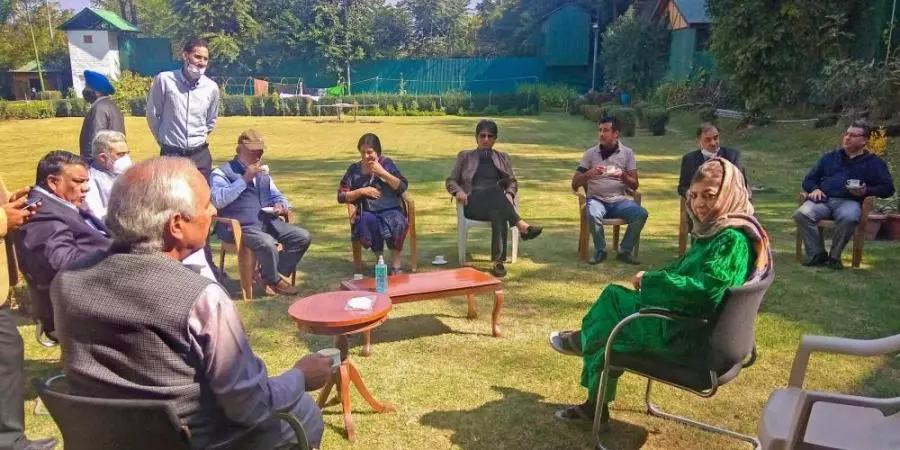
LS polls 2024: Gupkar Alliance on shaky ground as NC, PDP spar over seat-sharing talks
Mehbooba Mufti-led PDP is miffed over the NC’s decision to contest three Lok Sabha seats in Kashmir and Pir Panjal; NC argues that it has been flexible by not contesting all six seats and settling for three winnable ones

Cracks in the People’s Alliance for Gupkar Declaration (PAGD) in Jammu and Kashmir are widening. The National Conference (NC) is refusing to budge from its decision to field candidates for all three Lok Sabha seats in the Kashmir valley and Pir Panjal, leaving the People’s Democratic Party (PDP) enraged.
Dispute over the seat-sharing agreement for the upcoming parliamentary elections has triggered a war of words between the two political parties, with leaders taking the fight to social media platforms. Both the NC and the PDP are allies of the Congress-led INDIA bloc.
For his part, former chief minister and NC vice-president Omar Abdullah has refuted allegations that his party was rigid.
“No, how are we (NC) rigid? Had it been the case, we would have fielded our candidates for all six (parliamentary) seats, just like what Mamata Banerjee has done (in West Bengal). You will only appreciate flexibility when we would concede seats that we consider winnable,” he said.
“We have shown flexibility by not fielding our candidates for 50 percent of the seats. Can’t you see this as flexibility?” Abdullah said, adding, “show me any other state where any ally of the Congress-led INDIA bloc has entered into such an agreement and sacrificed 50 per cent of total seats! Is this our rigidity that we have even sacrificed a winning seat?"
Reacting to the NC’s move, former chief minister and PDP president Mehbooba Mufti said her party was least interested in engaging in any form of ‘dangal’ (wrestling) with any political party. Describing the recent developments as a “painful step for the people,” Mufti claimed that she tried her best to unite different political formations in a collective fight for the restoration of rights after the events of August 5, 2019.
Gupkar Alliance then and now
More than half a dozen political parties in August 2019 stitched a partnership against the Union government’s decision to remove Jammu and Kashmir’s semi-autonomy and special status under Articles 370 and 35(A). Parties that became a part of the new formation (PAGD) included NC, PDP, CPI(M), the Congress, the Awami National Conference, the Sajad Lone-led People’s Conference and the now-defunct People’s Movement then led by bureaucrat Shah Faesal. The last two lesser-known parties deserted the PAGD immediately.
For all practical purposes, the NC and the PDP remained the key members of the new conglomeration as both favour pre-August 5, 2019 status for Jammu and Kashmir.
Professor Noor Ahmad Baba, Kashmir’s well-known political scientist, said that local political groups and individuals formed the PAGD spontaneously in an emotionally charged atmosphere “to jointly resist the changes post August 5 2019”.
‘NC aiming to make PDP electorally irrelevant’
Baba, however, says that in the course of time, the unity began to fizzle out as “some of its (PAGD’s) constituents gradually began to reconcile with the emerging situation.”
“Now, even the PAGD’s major and core partners like the NC and the PDP are falling apart due to their inherent contradictions and electoral considerations. No one appears to be concerned about the new alliance's original objectives anymore,” he told The Federal.
Baba opines that electorally, NC seems to consider PDP as a “dispensable liability”. “The NC is probably aiming to exploit the current situation to render the PDP electorally irrelevant,” he added.
Today, the PDP is weaker than before, as many of its senior leaders have either deserted the party or have become redundant. This includes Haseeb Drabu, Altaf Bukhari, Mohammad Rafi Mir, Imran Ansari and Syed Basharat Bukhari among others. The PDP was formed in the late 1990s by Mufti Saeed along with Muzaffar Hussain Baig.
NC is considered Jammu and Kashmir’s oldest political formation. Its history dates back to 1931, when the Muslim Conference was formed. In the late 1930s, Sheikh Mohammad Abdullah rechristened the All Jammu and Kashmir Muslim Conference as the Jammu and Kashmir National Conference.
Not all hope is lost, says alliance’s convener
Kashmir-based CPI(M) leader Mohammed Yousuf Tarigami, also the convenor and chief spokesperson for the PAGD, refused to surrender hope in the alliance, stressing that he would continue to serve as a conduit between the bloc’s partners.
“Bigger parties have bigger responsibilities. I do hope they see the larger picture and sit together to resolve their differences or at least talk about their disagreements in an amicable manner,” Tarigami told The Federal.
Tarigami said he was working towards bridging the differences between the PDP and the NC. “Is it not possible to sit together and talk? I will try my level best to address the emerging situation. I will double my efforts to fix the cracks between the NC and the PDP over seat sharing for the upcoming parliamentary polls. Electorally, it is okay to have differences but we have to see the larger picture (objectives of the PAGD),” he added.

